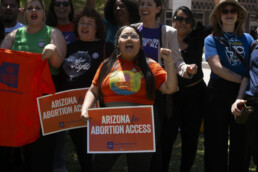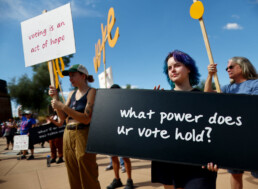How Do You Season Your Pets?
|
Greetings, Meteor readers, I hope you all had a fortuitous bingo night last night. Personally, I am writing a complaint to our bingo card maker for not having the foresight to include a box for “they’re eating cats and dogs in Ohio.” How did you miss such a predictable talking point, Bailey? Get it together. In today’s newsletter, we’re reminiscing about last night, bidding farewell to an icon, and appreciating the childless cat ladies in our lives. Grabbing the pepper grinder, Shannon Melero  WHAT'S GOING ONCan we even call it a debate?: Back in my day, a debate was an intense, well-researched sparring of words between people who knew what they were talking about, at least most of the time. But that’s not what we watched last night. Instead, the country had a front-row seat to the political equivalent of the final rap battle in 8 Mile. Vice President Harris was armed with razor-sharp attack lines like, “Donald Trump was fired by 81 million people,” all of which were designed to get under Trump’s skin, and all of which worked. And in true Trump fashion, instead of having some sort (or any sort) of game plan, he decided to freestyle. But you’re not a rapper, Don. The felon was flustered, reactionary, fumbling over his words. He wouldn’t look directly at “her” and “she” shut him down swiftly. (His use of the Vice President’s pronouns but never her name or her title felt like classic meant-to-belittle Trump.) Said Harris: “He’s trying to, again, divide and distract from the reality, which is: It is very well known that Donald Trump is weak and wrong on national security and foreign policy. It is well known that he admires dictators, wants to be a dictator on day one, according to himself.”  And he wasn’t just shut down by his opponent—for once, the moderators were ready with the fact check. When Trump lied and made the debunked argument that Democrats have made it legal to kill babies after birth, Linsey Davis clarified on live TV, “There is no state in this country where it is legal to kill a baby after it's born.” When journalists have to explain that infanticide is illegal in America, we’ve really lost the plot. (But if you want to know more about the history of that nasty little myth, Jessica Valenti’s got that here.) So, did we actually learn anything from this debate? The Trump we saw on TV was an angry, uninformed, and unqualified man trying to get a job he was already fired from. No revelations there. The display of Kamala Harris's adaptability, though, feels important and worth noting. The woman we saw last night was not the jovial “Momala” of memes and home cooking videos, but instead the Harris of Congressional hearings—skewering her opponents with sharpness and wit. She was a tactician, fully aware of her enemy and prepared to face him head-on, no matter how many times he tried to pretend she wasn’t in the room. It was satisfying to watch her unleash her master-class psychological jiu jitsu on one of the least likable men of all time. As Jessica Bennett wrote in The New York Times, “she laid bare the smallness of Trump’s manhood and asserted her own power.” There were also the brief moments where we actually got to hear about Harris’s agenda, certainly more than the “concepts of a plan” Trump shared. She gave air time to her stances on increasing child tax credits, restoring abortion rights, and tightening gun laws. Some of her other talking points, however, like support for fracking, maintaining the status quo of foreign relations, and her aversion to an Israeli arms embargo may not have inspired those still undecided. What is unquestionable about the debate, though, is that it was a battle. And as the great poet once said, “This guy don’t wanna battle, he’s shook.” AND:  MADONNA AND CHILD, 2024 (SCREENSHOT VIA INSTAGRAM)
 FOLLOW THE METEOR Thank you for reading The Meteor! Got this from a friend? Subscribe using their share code or sign up for your own copy, sent Tuesdays and Thursdays.
|
![]()
What Is "Reunification Therapy"?
|
Good evening, Meteor readers, Yesterday, on my morning drive, I saw a family posing on their stoop with big smiles and a sign proclaiming the first day of school for the four kids in uniforms. Their mom, snapping the photo, directing everyone to squish together, seemed so excited. I thought of that family when, a few hours later, news broke of a school shooting in Georgia—the 385th mass shooting this year, and the 23rd on a K-12 campus. The families at Apalachee High School woke up that day—just like my neighbors—dressing up their children, ready for a fresh start, trusting they’d come home safe. But now, four families are burying a loved one, and a community is irreparably damaged. And the name Apalachee will join Uvalde, Sandy Hook, Parkland, Columbine, Covenant, Marysville, Oxford, and on, and on, and on. And it feels like all we can do is ask the same questions over and over again: When will prayers become policy? Whose child will be the last straw? If not for them, then for who, Shannon Melero  WHAT'S GOING ONIt’s okay to separate a child from their abuser, actually: You may have read about the recent case out of Colorado in which a retired police officer who allegedly sexually assaulted his daughters currently walks free, while their mother is going to jail for trying to keep her children away from him. It would be easy to write it off as a one-off miscarriage of justice—but advocates say that it’s actually typical of the way in which family court cases often prioritize the wishes of parents, even if they’re abusive, over the well-being of a child. The backstory is this: The father, a former police officer, faces seven felony charges for allegedly sexually assaulting three of his daughters, as well as one misdemeanor child abuse charge for allegedly attempting to drown his son, who had confronted him over the crimes. He currently seeks custody of his two other, younger children, who live in a domestic violence shelter with their mother. The children have been ordered by the court to attend reunification therapy, a controversial treatment used by family courts to settle custody disputes. The children’s mother objects to the reunification therapy for several reasons: She believes the father is dangerous, and she worries about the effect the reunification therapy is having on her children. (Therapy sessions have left her children in the fetal position, crying uncontrollably, unable to sleep, and expressing thoughts of self-harm, she says.) So, she attempted to prevent her children from attending these sessions—and is now being held in contempt of court and sentenced to jail time. But she’s not the only one objecting to reunification therapy: The treatment has come under fire from many family court reform and feminist groups, who charge it provides abusive parents continued access to their victims. “Common sense tells us you can’t force a child to have a relationship or force two people to have a relationship if it’s fractured or if there’s no bond in the first place," Tina Swithin, an advocate for family court reform, has said. "Especially in cases where there is abuse, this is further traumatizing these children." Some states have already passed bans and limitations on court-ordered reunification therapy, such as requiring both parents' consent or prohibiting the use of "reunification camps," where children are sent with their alienated parent and cut off from their primary caregiver. But in many cases, its use is still widespread due to what the United Nations Human Rights Council calls "harmful gender stereotypes and discriminatory gender bias among family law judges." “Judges are suspicious about who is making the domestic abuse allegations,” attorney Suzanne Zaccour explained to Ms. “Often the woman might appear 'crazy' because she has suffered the impact of trauma and to them that makes her less credible…It's more comfortable to accept the explanation that women are crazy rather than that many men are violent...Judges cling to the idea that domestic abuse is rare and an exception." Children have a wide array of extremely valid reasons they may not want to remain in contact with a parent. And as long as family courts continue to prioritize reunification at all costs, they’ll quickly find that the cost is the child’s well-being—and, in too many cases, their life. —Bailey Wayne Hundl AND:
 WEEKEND READING 📚On being left out: There’s a specific group of women feminism forgot about: cheerleaders. (The 19th) On funds: Black women at the helm of abortion funds across the country are bringing reproductive justice to the masses. (Essence) On the sheets: A question for all to consider: “Was casual sex always this bad?” *cough* yes *cough* (The Cut) On the job: Guards at Rikers Island accused of assault are mysteriously still working at the jail. And some of them didn’t even know allegations had been made until journalists started asking questions. (Gothamist)  FOLLOW THE METEOR Thank you for reading The Meteor! Got this from a friend? Subscribe using their share code or sign up for your own copy, sent Tuesdays and Thursdays.
|
![]()
Be the Chappell Roan of Your Own Life
|
Greetings, Meteor readers, Inexplicably, we are in the final week of August, and on my drive this morning, I saw children in school uniforms making their way up the street. Why does it feel like autumn is creeping up on me like the villain in an M. Night Shyamalan film? In today’s newsletter, we’re sipping some coffee and reflecting on Chappell Roan’s reminder about workplace boundaries. Plus frightening updates out of Afghanistan, and how anti-trans legislators are also killing period poverty bills. No attachments, Shannon Melero  WHAT'S GOING ONBoundaries: Last week, Chappell Roan hit the internet like rompompapom with a simple request: “Please stop touching me. Please stop being weird to my family and friends.” The ask was part of a longer statement Roan released on Instagram laying out her personal boundaries, making it very clear that when she’s not at work, she is fully clocked out and doesn’t want to be harassed by “superfans” or touched in public. “There is a part of myself that is just for me, and I don’t want that taken away from me.” And as is the case when a woman in public dares to establish a boundary, it was not well received by some. Disgruntled fans posted response videos online (Roan wisely turned off commenting on the original post) and wrote things like, “We made you” and “It’s the cost of being famous.”  THE FACE OF A WOMAN WHO WILL NOT BE BOTHERED. (VIA GETTY IMAGES) But Roan hits on the larger, darker problem behind the abusive “superfan” behavior that we’ve come to accept as a part of the fame package. There are numerous documentaries about famous people who were sexualized, stalked, harassed, and in some cases attacked by people who professed to be true fans and as we collectively look at those stories in hindsight, it’s easy to say, wow someone should have done something back then. What Roan is telling us in her post is that this is the “back then” moment where something can be done so that a decade from now, we’re not watching the documentary that explains how her career ruined her life. Her pushback against always-on expectations also reflects a social shift that even those of us without fans are feeling. A new report found that workers between the ages of 25-34 are taking 29 percent more sick days than their older colleagues. “People are missing work because they're overwhelmed or burned out, or they just need a day to reset,” researchers found. And when they are at work, more and more people are taking their cut-off times seriously. Just yesterday in Australia a law went into effect designed to protect employees who “refuse to monitor, read or respond to contact or attempted contact outside their working hours.” Unsurprisingly, no such law exists in the U.S. (although an attempt is being made in San Francisco), which explains why even after a global pandemic changed the way we look at work, we’re still trying to figure out how to look at boundaries. So let this be your friendly reminder that you can be the Chappell Roan of your own life and tell your boss that super graphic ultra modern girls need to be fully clocked out after hours. AND:
 SCREENSHOT VIA GENERAL MILLS
 FOLLOW THE METEOR Thank you for reading The Meteor! Got this from a friend? Subscribe using their share code or sign up for your own copy, sent Tuesdays and Thursdays.
|
![]()
What We Learned at the DNC
|
Greetings, Meteor readers, I’ve been near tears all week and it’s not just because of this guy. But it’s college move-in week for lots of youngsters, including the eldest Gen-Zer in my family, and for anyone else out there trying not to weep in the doorway of a dorm room, we send hugs. In today’s newsletter, we’re looking at another reason you might be tearing up: the emotion on display at the Democratic National Convention—heading into its final night tonight and a Big Speech from the candidate. Also, an alarming new study about LGBTQ+ asylum seekers, and, of course, your weekend reading list. Congrats to all the new freshmen, Shannon Melero  WHAT'S GOING ONWhat we saw at the DNC: The final night of the Democratic National Convention is upon us, and it’s been a rousing few days. There was Michelle Obama temporarily abandoning “we go high” to dunk on Trump the way only Michelle Obama can: “Who’s gonna tell him the job he’s currently seeking might just be one of those ‘Black jobs’?” There was the queen of the mic Oprah Winfrey reminding us that when a house is on fire, we try to save everyone—and if the place happens to belong to a childless cat lady, we try to get the cat out, too.” And there was Tim Walz stepping up to be America’s Ted Lasso, using what writer Jessica Bennett calls his “jock insurance” to show a warmer side of political manhood. Basically, the Party has never felt so in step with the actual people (sort of; we’ll get to that in a second). As incredible as the energy was on the main stage, it felt doubly charged at The Meteor and Emerge’s Power Lounge, where we heard from brilliant women, men, and non-binary people about the issues they care about. Deja Foxx and other Gen Z political players highlighted the economy as a Gen-Z issue; we hung out with Wonder Woman; we got inside the “White Dudes for Harris” movement; and, in what was really a breathtaking moment, several of the fierce and determined women who have testified about their experiences under abortion bans came together onstage to tell Busy Philipps why this issue matters so much. Of course, the Harris candidacy was a prime topic. As San Francisco Mayor London Breed said, in reference to the media’s usual handwringing about whether America is ready for a Black woman president, “They’re not ready? They better get ready.” One of the most powerful moments of the talk series came during a conversation with Rep. Jasmine Crockett. “We have to win this election because there is danger lurking around the corner,” she said. “I don’t think people should be convinced their freedoms can’t be cut. So if you think that you’re safe, I promise you, you are not. This isn’t about whether you agree with abortion or not. This is about whether you think we should live in the land of the free.” You can view all of the Power Lounge panels here, but we highly suggest starting with the video below. However, while the goal of the DNC was inclusion, not quite everyone got an invite to the main stage. Missing from the grand narrative of the DNC’s success have been Palestinian voices. While protests continue inside and outside the convention center, with activists and delegates applying pressure on the Democratic party to put their full force behind an “immediate and permanent” ceasefire, on-stage speakers have either chosen silence or shared vague statements about ceasefires. Meanwhile, the Uncommitted Movement spent the week making their presence felt and spoke to whoever was willing to listen, including our favorite OB-GYN, Dr. Heather Irobunda. That issue won’t be going away any time soon: Once the confetti is swept away and the celebrities, speakers, and delegates go their own way, the Harris campaign will still have to, as Rep. Crockett said on her panel, “connect with people on a deeper level.” They will still have to show voters that all of this hope and enthusiasm will convert to action and a presidency that reflects the needs of all Americans. And that would be truly historic. AND:
 THIS MAN JUST WANTS TO GO HOME TO HIS DUNKIES AND CIGARETTES.  WEEKEND READING 📚On 📠: Who fact-checks the fact-checkers? (Popular Information) Sobre El Amor es Ciego: Netflix recently wrapped up its first season of Love Is Blind: Mexico which, like its American predecessor, had a little bit of everything, including unabashed colorism. (De Los) On a good tax: What could a carbon tax do for the economy? For starters, it could fund universal basic income. (Atmos)  FOLLOW THE METEOR Thank you for reading The Meteor! Got this from a friend? Subscribe using their share code or sign up for your own copy, sent Tuesdays and Thursdays.
|
![]()
The Real Stars of the DNC
 August 20, 2024 Greetings, Meteor readers, I hope you’ve recovered and hydrated and are ready to take on night two of the Democratic National Convention (I am neither of those things, be better than me). Obviously, we are digging into night one in today’s letter, but as usual, we are asking the real question other outlets seem to be ignoring: What time is Beyoncé getting there? Also in today’s newsletter, the world outside the DNC, including some head-scratching sports news and a moment of trans joy in Colombia. I hope she plays Single (cat) Ladies, Shannon Melero  WHAT'S GOING ON VIA GETTY IMAGES WHAT'S GOING ONThe Real Stars of the DNC: It was opening night in Chicago last night, with celebrities, advocates, and politicians coming together to rally behind Vice President Kamala Harris. Harris herself spoke briefly at the top (and then beamed and hugged for the rest of the evening), but we found ourselves perhaps uncharacteristically choked up by the touching sunrise/sunset moment between President Biden and the woman he may soon be calling Madame President. Biden’s speech was an important and much-needed unifying moment for the Democrats, who still have their work cut out for them in swaying the uncommitted vote and inspiring voter turnout, especially in swing states. But if we’re being entirely frank, it was just kind of nice to see a white guy admit to being not quite perfect for the job anymore. “I made a lot of mistakes in my career, but I gave my best to you for 50 years,” he said. We love a vulnerable moment. But it wasn’t all Joe and Kamala; the night was made truly special by the extent to which abortion was unapologetically front and center (even Biden himself said it). Most significantly, Amanda Zurawski, Katilyn Joshua, and Hadley Duvall all shared their stories: Zurawski and Joshua of being denied abortion care under Dobbs, and Duvall of her own pre-Dobbs abortion after having been raped by her stepfather at age 12 (an abortion, she notes, that young victims today might be denied). As our friends at The 19th note, this is the first post-Roe DNC and abortion is no longer a hush-hush issue. It’s an election winner, and the DNC programmed it as such. There was another interesting thing happening last night: Perhaps inspired bythe Republican party’s attempt to be the party of the working man, Democrats embraced working-family policies and people, and put them on the stage. Representative Alexandria Ocasio-Cortez, the poster child of working-class Democrats, gave a rousing speech about Harris’ dedication to workers, as compared to Trump’s love of union-busting. (Before her, UAW president Shawn Fain had the whole crowd chanting “Trump’s a scab!”) AOC was her usual electrifying self and even made mention of Harris’s work towards solidifying a ceasefire. All in all, as they say in job reviews, it feels as if the Democrats have heard the feedback and taken some productive and necessary steps. They’re operating with an invigorated sense of urgency and what at least looks like a real embrace of what changes Americans want to see. Let’s hope they keep their foot on the gas. And in case you forgot, The Meteor is at the DNC this week, at the Power Lounge at McCormick Place, in partnership with Emerge. You can get all the details and find out how to watch the livestream starting tomorrow morning here. AND:
 FOLLOW THE METEOR Thank you for reading The Meteor! Got this from a friend? Subscribe using their share code or sign up for your own copy, sent Tuesdays and Thursdays.
|
![]()
A Visual Celebration of Muslim Women Athletes
Because their wins matter as much as their challenges
BY EMAN MOHAMMED AND SHANNON MELERO
As the fanfare of the 2024 Olympics winds down and athletes make their way back from Paris, we all settle into reality. No more marathon rugby matches, no more Snoop Dogg talking about horses, and no more eyes of the world peering at France and discussing the country’s Islamophobic ban on French competitors wearing hijab.
But for hijabi athletes and Muslims the world over, this is not a once-every-four-years conversation, it’s everyday life. There are an estimated three million Muslim people living in France, for instance, and the country’s total ban on headscarves in “secular”—including but not limited to athletic—settings is a reminder of the limited space that Muslim women are allowed to occupy in sports.
And yet, they are there, not on the edges as inspirational stories of marginalized people beating the odds, but in the center. In the gym, on the track, in the weight room. Competitors, athletes, whole beings who only come to our notice when the global spotlight points at them, as when fencer Ibtihaj Mohammed won big in the 2016 Olympics. “But there’s more than just Ibtihaj out there,” Eman Mohammed says. Eman is a Palestinian photojournalist who has spent the last two years traveling the U.S. on and off to photograph Muslim women athletes in their day to day lives.
Mohammed’s work captures the joy and tenacity of these sportswomen. “It’s uncanny that those who often speak at length about the oppression of Muslim women are not as quick to celebrate their accomplishments and victories in the sports arena,” she notes. “True advocacy for Muslim women athletes means recognizing and celebrating their successes with the same vigor with which we discuss their obstacles.”
Her collection of photos, a gorgeous and caring glimpse into the lives of women training to be the best in their field, is a moving reminder of what we miss when we fail to look beyond what someone does (or doesn’t) wear on their head.
Aya Elsekhely - Track and Field


Aya Elsekhely grew up in predominantly white Clark Township NJ. "Running reaffirms my strength and place in this world," she says. A track athlete in college, where she ran the 400 meter hurdles, 800 meter, and the heptathlon, Elsekhely had a baby eighteen months ago. She’s now returned to marathon running.
Noor Kabbani - Powerlifting


Noor Kabbani is a competitive powerlifter and a boxing coach in Virginia. Kabbani’s journey in powerlifting turned professional during the pandemic, where she competed in statewide competitions and ranked among the top ten competitors. Noor says she plans to continue competing in weightlifting until she’s 70 and is working toward qualifying for world competitions.
Subreen Dari, weightlifting


Subreen Dari, a full-time nurse and mom in Ohio, is also a weightlifter and was the first woman to represent Palestine at an international weightlifting competition in 2022. She currently has her sights set on qualifying for the 2028 Olympics.
Zahra Khan, climbing


Zahra Khan, a nurse in Seattle, balances her professional commitments with her passion for rock climbing, a sport that serves as both a physical outlet and a mental respite from her demanding healthcare career. Her recent V9 climb—a grade that marks high difficulty—stands as a testament to her skill and tenacity. “Climbing is more than reaching the top; it’s about the journey of overcoming,” she says. “I climb to challenge myself and to inspire others who might doubt their place in this sport.”
Sana Abubaker, basketball


Sana Abubaker discovered her passion for basketball in middle school and now coaches young athletes. She emphasizes the importance of creating a supportive environment, and says the encouragement from her own team and coach made a significant difference: “Seeing a crowd cheer for you is uplifting, but having a team and a coach who support you no matter what is transformative.”
Aprar Hassan, karate


Aprar Hassan, 22, has been mastering the art of karate since the age of three and has gone on to become a national karate champion, winning a gold medal in Florida. “Karate is not just a sport to me; it's a platform to affirm my identity and capabilities,” Hassan says.
ABOUT EMAN MOHAMMED
Eman Mohammed is an award-winning Palestinian photojournalist from Gaza and Senior TED fellow. Her work has been featured in Le Monde, VICE, The Washington Post, The Atlantic and more.
Three Years of Taliban Rule
 August 15, 2024 Howdy, Meteor readers, We’re going on a road trip and we’d love it if y'all joined us—specifically, in Chicago at the Democratic National Convention next week! We’ll be hosting the Power Lounge at McCormick Place, in partnership with Emerge—an organization that trains women to run for office— on August 21st-22nd. We’ll be hosting conversations with trailblazers like Rep. Jasmine Crockett, State Rep. Gloria Johnson (of the Tennessee Three), Brittany Packnett Cunningham, Connie Britton and lots more. You can register for this event by clicking the image below. See you in Chicago! But before we hit the road, let’s hit this newsletter. Today marked the three-year anniversary of the Taliban’s return to power in Afghanistan. We spoke with Sahar Halaimzai, the director for the Afghanistan Initiative at the Malala Fund, about what life has been like for Afghan women ever since. Plus, your weekend reading list. DNCya later, Shannon Melero  WHAT'S GOING ON
 Three Questions About...Gender ApartheidOn the anniversary of the Taliban’s return to power, an advocate explains what life has been like for women in Afghanistan OLYMPIC RUNNER KIMIA YOUSOFI OF TEAM AFGHANISTAN HOLDS A SIGN THAT READS, "EDUCATION" AND "OUR RIGHTS" AFTER RUNNING THE WOMEN'S 100 METER. POLITICAL AND PROTEST SIGNAGE WAS BANNED DURING THE 2024 OLYMPICS IN PARIS. (VIA GETTY IMAGES) Three years ago today, Taliban forces seized Kabul and restored an oppressive theocratic regime to power. You probably remember the images: people attempting to flee, clinging to airplanes, parents handing babies over fences to strangers. And yet, as quickly as those images came across our screens, they vanished. Over the last three years, women in Afghanistan have lost their ability to work, and girls have been barred from higher education, but in the West, their plight has largely been pushed from the front pages. The Malala Fund, founded by Nobel laureate Malala Yousafzi and her father, Ziauddin, is working to change that. We asked the Fund’s Afghanistan director, Sahar Halaimzai, three questions. What has been the most significant change in the everyday lives of Afghan women since 2021? Women and girls have experienced a total rollback of their basic rights. The Taliban have banned girls from attending school beyond the sixth grade and women from most forms of employment. There are also severe restrictions on women’s freedom of movement and access to public spaces. They cannot enjoy a stroll in a park or go to the salon to get a haircut. This oppression is systemic, institutionalized, and a core part of the Taliban’s governance model; it’s a system of gender apartheid. But as of now, the international community does not legally recognize gender apartheid as a crime despite support from Afghan activists and many global experts, including prominent feminists and legal scholars. Daily life is fraught with danger. [But] there are many brave women and girls who continue to protest, run or attend underground schools, and organize advocacy efforts to fight for their rights. If caught, these women have been subjected to violence and harassment, arbitrary detention, torture, and enforced disappearances. The Taliban have also targeted their families, using coercion and violence to suppress any form of resistance. Despite these risks, Afghan women remain resilient. Has the lack of Western media focus on the plight of Afghan women impacted the movement? Absolutely. Without sustained media attention, it is difficult to maintain the pressure needed to hold the Taliban accountable or support Afghan women and girls. Instead, what we are seeing is a creeping normalization of the Taliban’s atrocities, making it easier to sideline women’s and girls’ rights in favor of other interests. If we could get more media outlets to cover what’s happening in Afghanistan as gender apartheid, it could reignite global solidarity for Afghan women and pressure leaders to take action. What needs to happen to protect the rights of women and girls in Afghanistan—and is there anything the average person can do to help? The international community must recognize gender apartheid as a crime under international law. This recognition would open legal avenues to hold the Taliban accountable for their atrocities. There's a real opportunity to do this: the United Nations General Assembly's Sixth Committee is currently debating the draft language of the Crimes against Humanity treaty. In October 2024, the Committee will resume discussions and vote on whether to advance the treaty to the next stage—a pivotal moment that could solidify international legal frameworks to address and prevent such egregious human rights violations. Everyone can contribute to this push by supporting organizations like [ours] that advocate for Afghan women’s rights, amplifying their stories, and by pressuring their governments to take decisive action during this critical period, first by naming what is happening in Afghanistan as gender apartheid. The situation in Afghanistan is not just a localized issue but a global human rights crisis. The Taliban’s gender apartheid…sets a dangerous precedent. If our elected representatives are happy to engage with a governance system that, at its core, is about enforcing gender apartheid, it signals that women’s rights are negotiable and can be easily sacrificed.  WEEKEND READING 📚On boy things: Are big loud podcast voices like Joe Rogan moving more young men to the right? (The Guardian) On lingering questions: Who is this woman and how did she make it to the Olympics? (The Root) On health: Routine pap smears have been unpleasant and uncomfortable since the dawn of time, but a less intrusive new alternative is right on the horizon. (New York Times)  FOLLOW THE METEOR Thank you for reading The Meteor! Got this from a friend? Subscribe using their share code or sign up for your own copy, sent Tuesdays and Thursdays.
|
![]()
Three Questions About Arizona's Abortion Ballot Initiative
With an insider who helped make it happen
By Samhita Mukhopadhyay
Yesterday, the Arizona secretary of state’s office confirmed that over half a million people had signed to certify a ballot initiative that would enshrine access to abortion into the state constitution. According to NPR, that number represents the most signatures for a ballot measure in the history of the state.
And getting abortion into the constitution is crucial. Arizona’s abortion laws have been in the spotlight because of its 160-year-old “zombie” law, which briefly banned abortion throughout the state this spring. Thanks to (mostly female) legislator pressure, the law goes off the books next month, but “without a constitutional amendment another group of politicians can come right back in January and pass another extreme ban or continue to put onerous restrictions on access,” says Arizona for Abortion Access’ communications director Dawn Penich, whose coalition mobilized 7,000 volunteers to collect signatures.
We asked Penich three questions about this huge win, and what comes next.
Samhita Mukhopadhyay: First of all, congratulations and thank you. You surpassed the numbers needed for certification by a lot. What was the process for getting there? And what was the hardest part?
Dawn Penich: We've been working toward this for over a year at this point. It was last summer that we formed a coalition, started writing the language for this measure and forming a campaign and then spent more than nine months collecting signatures all over the state. And if you know anything about Arizona, that means that we were collecting in snowstorms, but also collecting in 115-degree weather.
So I would say that was the hardest part, just asking our 7,000 volunteers to be out there day after day. But I have to tell you, it wasn't hard because people are so driven and passionate about this issue that they said, yeah, it's hot, but I don't care. I need to be part of a solution. I need to be part of righting this wrong. And so getting the news yesterday that our signatures were certified and we are on the ballot just felt amazing and was a huge validation for the amount of work that we've been putting in and we'll continue to put in for the next 90 days.
It just really proves the point that even in Arizona, which is considered a more conservative state on some issues, most voters support access to abortion.
That's right. We totally saw that when we would be in…the red parts of town. More conservative people do come to this issue from a different perspective: They look at it as small government and keeping the government out of their private lives, whereas other people come to it through a women's rights or a reproductive freedom lens. So people have different ways of coming to support access to abortion, and that's why we were able to collect so many signatures. We also think we're going to be the latest in the long line of reproductive freedom wins this November.
Were there any major efforts to push back on the initiative?
There were some feeble attempts throughout the course of collecting our signatures. Folks would show up holding stop signs or try to lie about what our measure does and pass off misinformation. But I got to hand it to 'em: Arizona voters are smarter than that. It did nothing but backfire. They would kind of get the attention of people walking by, and then those people would say, Oh, is that the abortion access petition? Let me hurry up and sign that. We don't take it lightly, but we do know that we are the majority, and that majority will turn out in November as well.
An abortion victory in Arizona
 August 13, 2024 Salutations, Meteor readers, I have returned from my sojourn to the Hudson River Valley region, where my life was changed by a cow named Rosie. Anything interesting happen while I was gone? Rhetorical question; I read this newsletter just like you do, so I know. Today we’ve got a lot to cover—including a discrimination lawsuit, Olympic withdrawal, and three questions for an insider who helped get abortion on the ballot in Arizona. Walking back into the office like this, Shannon Melero  WHAT'S GOING ONContinued fallout: In the 26 months since the Dobbs decision, hundreds of women have shared their horror stories of trying to seek reproductive care from doctors and hospitals operating in mass confusion and fear. Kelsie Norris-De La Cruz and Kyleigh Thurman are two more names to add to the list. Last week, both Norris-De La Cruz and Thurman filed federal complaints against two different hospitals in Texas that they claim refused to perform abortions in order to treat their ectopic pregnancies. (If you’re just joining us, ectopic pregnancies occur when a fetus develops outside of a uterus, and are almost never viable.) In both women’s cases, their fetuses implanted in their fallopian tubes. The hospitals they went to, Texas Health Arlington Memorial Hospital and Ascension Seton Williamson Hospital respectively, sent both of them home. Norris-De La Cruz sought a second opinion and was scheduled for surgery elsewhere. Thurman returned to Ascension several days later. But as Shefali Luthra of The 19th reported yesterday, it was too late: “By the time both could receive abortions, their pregnancies had ruptured. Both women had to have their affected fallopian tube removed.”  A DEMONSTRATOR AT A REPRODUCTIVE RIGHTS RALLY. (PHOTO BY MONTINIQUE MONROE/GETTY IMAGES) Abortion is banned in Texas but, at least on paper, there is a carve out for extreme cases where the life of the mother is at risk. Ectopic pregnancies fall under the category. And yet this isn’t the first time the state has been sued for how the language in the abortion ban has hamstrung doctors in cases where they would normally be quick to act. That’s because if a doctor in Texas were to perform an abortion, they would have to prove in court that their decision was protected by law, and should a court disagree, they could face jail time. It is an impossible decision, and yet it’s still one that states like Texas, Idaho, and Tennessee are forcing doctors to make. It’s also worth noting that a big part of this lawsuit is the hospitals’ failure to comply with the Emergency Medical Treatment and Labor Act (EMTALA) which states that a hospital receiving federal Medicare dollars must provide emergency abortions when necessary even if its against state law. Perhaps if SCOTUS hadn’t dismissed the Idaho EMTALA case in June, and actually made a full-throated ruling doctors would have a clearer understanding of what they’re allowed to do without having to consult a bevy of lawyers. To learn how you can help those seeking reproductive care in Texas, visit Fund Texas Choice. AND:
 WINNING IS NICE
Three Questions About Arizona's Abortion Ballot InitiativeWith an insider who helped make it happenBY SAMHITA MUKHOPADHYAY  A BIG THANK YOU TO EVERYONE WHO WEATHERED THE ARIZONA SUN TO MAKE THIS HAPPEN. (PHOTO BY REBECCA NOBLE/GETTY IMAGES) Yesterday, the Arizona secretary of state’s office confirmed that over half a million people had signed to certify a ballot initiative that would enshrine access to abortion into the state constitution. According to NPR, that number represents the most signatures for a ballot measure in the history of the state. And getting abortion into the constitution is crucial. Arizona’s abortion laws have been in the spotlight because of its 160-year-old “zombie” law, which briefly banned abortion throughout the state this spring. Thanks to (mostly female) legislator pressure, the law goes off the books next month, but “without a constitutional amendment another group of politicians can come right back in January and pass another extreme ban or continue to put onerous restrictions on access,” says Arizona for Abortion Access’ communications director Dawn Penich, whose coalition mobilized 7,000 volunteers to collect signatures. We asked Penich three questions about this huge win, and what comes next.  WE LOVE A WIN! (PHOTO BY REBECCA NOBLE/GETTY IMAGES) Samhita Mukhopadhyay: First of all, congratulations and thank you. You surpassed the numbers needed for certification by a lot. What was the process for getting there? And what was the hardest part? Dawn Penich: We've been working toward this for over a year at this point. It was last summer that we formed a coalition, started writing the language for this measure and forming a campaign and then spent more than nine months collecting signatures all over the state. And if you know anything about Arizona, that means that we were collecting in snowstorms, but also collecting in 115-degree weather. So I would say that was the hardest part, just asking our 7,000 volunteers to be out there day after day. But I have to tell you, it wasn't hard because people are so driven and passionate about this issue that they said, yeah, it's hot, but I don't care. I need to be part of a solution. I need to be part of righting this wrong. And so getting the news yesterday that our signatures were certified and we are on the ballot just felt amazing and was a huge validation for the amount of work that we've been putting in and we'll continue to put in for the next 90 days. It just really proves the point that even in Arizona, which is considered a more conservative state on some issues, most voters support access to abortion. That's right. We totally saw that when we would be in…the red parts of town. More conservative people do come to this issue from a different perspective: They look at it as small government and keeping the government out of their private lives, whereas other people come to it through a women's rights or a reproductive freedom lens. So people have different ways of coming to support access to abortion, and that's why we were able to collect so many signatures. We also think we're going to be the latest in the long line of reproductive freedom wins this November. Were there any major efforts to push back on the initiative? There were some feeble attempts throughout the course of collecting our signatures. Folks would show up holding stop signs or try to lie about what our measure does and pass off misinformation. But I got to hand it to 'em: Arizona voters are smarter than that. It did nothing but backfire. They would kind of get the attention of people walking by, and then those people would say, Oh, is that the abortion access petition? Let me hurry up and sign that. We don't take it lightly, but we do know that we are the majority, and that majority will turn out in November as well.  FOLLOW THE METEOR Thank you for reading The Meteor! Got this from a friend?
|
![]()
Another Country Fights for Democracy
 July 30, 2024 Ahoy, Meteor readers, I have been watching Olympic rugby sevens since 9:30 this morning. I was initially watching to support social media sensation Ilona Maher—but I got hooked, kept watching, and friends, it was worth it: Today I got to see these women make history: In today’s newsletter, we travel to Venezuela, where a hotly contested election has drawn hundreds of protestors. Plus, a new abortion ban goes into effect—and, of course, there’s more Olympics. I love sports, Shannon Melero  WHAT'S GOING ONVenezuela fights for a fair election: Yesterday, thousands of Venezuelans flooded the streets to protest the results of Sunday’s election, in which officials had declared incumbent President Nicolas Maduro the winner. The opposing candidate Edmundo González and government opposition leader Maria Corina Machado are saying they have undeniable proof that the election—which had the highest turnout in years—was actually won by González. Their claims have some backing: Maduro’s government has yet to provide verification for the election results, and the opposition has paper tallies which they claim show they won by at least three million votes. Several countries in the region have denounced the election results. The high voter turnout was motivated largely by González and Machado, who have been harnessing Venezuela’s young voters in an effort to overturn 25 years of authoritarian rule. Millions cannot afford food or medicine and polling showed that if Maduro remains in power, many plan to flee the country. But Maduro won’t go quietly into that long good night—sound familiar?—and the reverberations of that decision could be disastrous. As one expert points out, “[If] Maduro clings to power by fraud and other illegitimate means, Venezuela will have missed perhaps its last best chance at change for a long time. Instability will persist and perhaps deepen, and Latin America and the United States will have no choice but to absorb the consequence.” AND:

 FOLLOW THE METEOR Thank you for reading The Meteor! Got this from a friend? Subscribe using their share code or sign up for your own copy, sent Tuesdays and Thursdays.
|
![]()



























